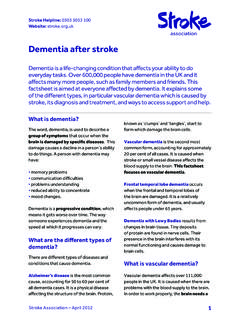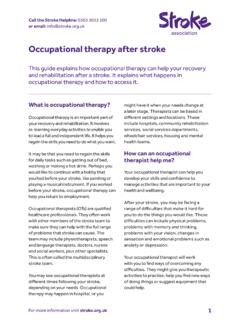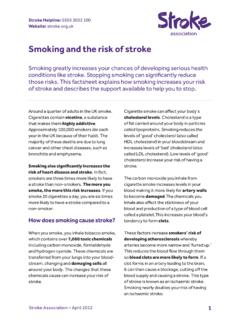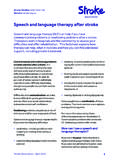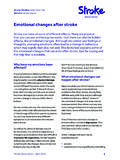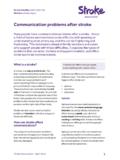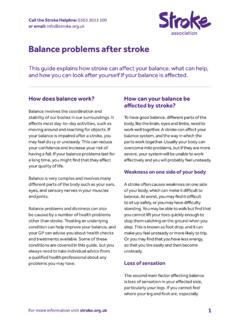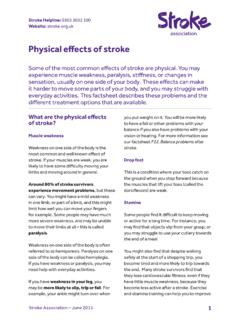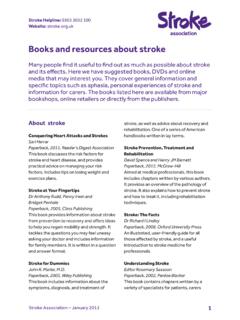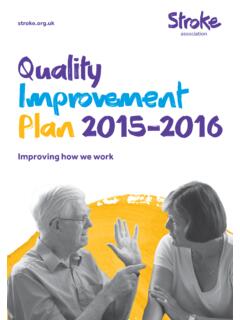Transcription of A complete guide to Cognitive problems after stroke
1 A complete guide to Cognitive problems after strokeCognitive problems after strokeA complete guide to2 Cognitive problems after strokeA stroke can affect the way your brain understands, organises and stores information. This is known as guide explains the different ways a stroke can affect your cognition, the problems this can cause and what you can do about them. It s aimed at people who have had a stroke but there is information for family and friends as have information on all aspects of stroke .
2 If you have a question that is not answered in this guide visit or call our stroke Helpline on 0303 3033 problems after strokeWhy has my cognition been affected? 4 What kinds of problems can this cause? 5 problems with concentration 5 Memory problems 6 problems with planning and problem-solving 7 problems noticing things on one side 8 problems moving or controlling your body 9 problems with movement and finding your way around 9 Confusion and denial 10 problems recognising things 11 Will it get better?
3 12 Are there treatments that can help? 13 What can I do about my Cognitive problems ? 14 What can I do about my concentration? 16 What can I do about my memory? 17 What can I do about my planning and problem-solving? 19 What can I do about other Cognitive problems ? 19 Where to get help and information 20 From the stroke Association 20 Other sources of help and information 21 Tips for family and friends 22 About our information 23 What s in this guide ?4 Cognitive problems after strokeWhy has my cognition been affected?
4 Every second you receive a huge amount of information from the world around you, which your brain has to understand, organise and keep. This is called cognition. If your cognition is affected, then you could find it difficult to concentrate or remember certain things. You may also find it difficult to work out how to do something or know how to respond to what s going on around you. This is what people mean when they talk about Cognitive problems or Cognitive problems happen because of damage to your brain.
5 Different parts of your brain control different things. If one of the parts of your brain that control cognition is damaged by a stroke , then this can affect your ability to do certain problems are very common after a stroke . They can have an impact on the person and can also affect their family and relationships. Noticing Cognitive problemsIt can be difficult to notice Cognitive problems when you re in hospital. On the stroke unit there s always a lot going on and you tend to get a lot of help with everyday things (nurses will remind you when to take your medication or help you find your way around, for example).
6 Because of this, many people don t notice that they have problems until they return home. Even then, you may not notice until you go back to work or start to do more demanding activities again, such as you re in hospital, your stroke team should complete an assessment with you to find out if you have any Cognitive problems . However, these Cognitive assessments will only pick up on severe problems . More detailed assessments are needed to find less obvious problems , but these are used less often. 5 Cognitive problems after strokeProblems with concentrationWhen you concentrate on something, your brain has to screen out a lot of information coming in from the world around you.
7 A stroke can affect your brain s ability to do this. Concentration problems are especially common in the early stages after a with concentration can affect you in different ways, as we rely on it for all of our other thinking processes. If you find it hard to focus on something, then you re not going know how to respond to it or be able to remember it effects of stroke can make your concentration worse too. Tiredness, pain or emotional problems like depression can all affect your ability to take information in and stay focused.
8 Signs of concentration problemsIf you re having problems with your concentration you may not be able to: filter out what s going on around you, so it may be difficult to chat to someone if you re in a noisy room or find what you re looking for in the supermarket stay focused on a single task, like reading a book or watching a television programme move from one task to another very easily, so if you re interrupted, you may find it difficult to return to whatever you were doing before do more than one thing at once.
9 So you may find it difficult to chat to someone and make a cup of tea at the same time process things very quickly, so you may find it hard to follow people who talk very quickly or it may take you longer to do things than it used kinds of problems can this cause?6 Cognitive problems after strokeMemory problemsWe store all kinds of information in our memory. We also remember things in different ways, and for different lengths of time. This is known as short-term and long-term memory. Your short-term memory is like a temporary storehouse for information.
10 It allows you to remember things just long enough for you to use them. When you read a telephone number, for example, you use your short-term memory to remember it for the few seconds it takes you to dial. Some people also call this your working memory. If you need to remember something for longer than this, it moves to your long-term memory. This lets you recall events and feelings from the people have problems with their memory after a stroke , especially in the first weeks and months. However, they may not always be down to a problem with your memory memory problems are actually caused by problems with concentration, because if you re unable to focus on what you re being told, you re not going to be able to remember it later.
